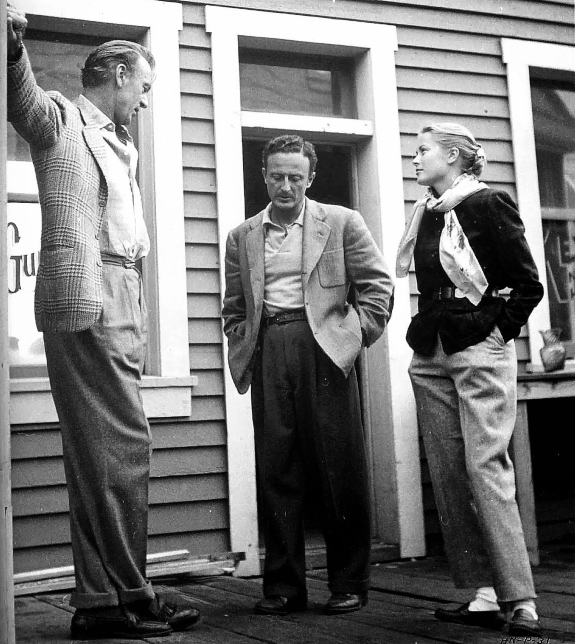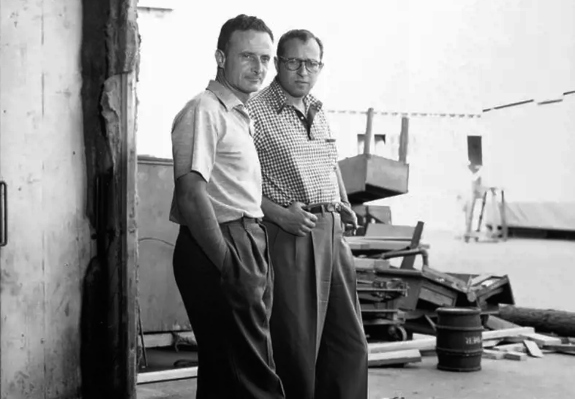On 21 September 1953
, Oscar Hammerstein II wrote a letter to director Fred Zinnemann, expressing his concern over the slow casting process of
Oklahoma!. Zinnemann had been hired to direct the film adaptation of Rogers and Hammerstein's successful Broadway show, and Hammerstein
—he and Rogers were the film's (uncredited) executive producers— was eager to get the ball rolling. Interested to know how things stood with Paul Newman who was considered for the role of the male protagonist Curly, Hammerstein wrote: "
I spoke to Dick Rogers on the 'phone yesterday and I was disappointed to hear that so little had been done since I left, he had no report on the young man in whom we were so interested (was his name Newman?)
I hope you, Dick and Arthur will follow this up right away." [read the full letter
here].
Shortly after receiving Hammerstein's letter, Zinnemann held two days of auditions with Paul Newman and several other actors. One of them was James Dean who, like Newman, was trying to land his first film role as cowboy Curly (admittedly, Dean had appeared in films before but these roles were uncredited). Also tested were Joanne Woodward for the female lead role of Laurey, Rod Steiger for the role of Jud, and a few others. On 30 September 1953, Zinnemann reported back to Hammerstein, informing him about the recently held screen tests. Zinnemann's letter is shown below and is especially noteworthy for his remarks on Newman and Dean.
 |
| James Dean, Paul Newman, Joanne Woodward and Rod Steiger all auditioned for roles in "Oklahoma!", but only the latter was eventually cast. |
 |
| Oscar Hammerstein II (left) and Fred Zinnemann on the set of "Oklahoma!". |
Images letter via:
Playbill Vault
Original source:
Margaret Herrick Library, Academy of Motion Picture Arts and Sciences
Transcript:
September
30th
1953
Dear Oscar:
We had two full days of tests- Monday and Tuesday. I think that this is as good a time as any to report on my impressions. Arthur and I will not see the rushes until tomorrow, but I feel confident that seeing the rushes will not influence my present reactions. Also, tomorrow will be a very mixed-up day because I will be leaving for the coast and I am afraid that it would be impossible for me to write at that time.
Of the people tested, I was very much impressed with Eli Wallach, Rod Steiger, Joanne Woodward and James Dean (Curly). Wallach, I thought, was exceedingly original and yet he maintained the traditional feeling of "Oklahoma!". He was quite far away from any conventional acting and he got a great many laughs from the crew. I believe he could do extremely well as the Peddler, and I think it will be very difficult to improve on him.
Joanne has a lovely quality. It may be that she is a bit too wistful for the part, and perhaps she doesn't have quite the kind of radiance and vitality required for Laury. However, I was amazed at her ability to play the part believably- as though she were a very young and naive teenager.
Paul Newman is a handsome boy but quite stiff, to my disappointment. He lacks experience and would need a great deal of work. Still, in the long run he may be the right boy for us. He certainly has a most winning personality although I wish he had a little more cockiness and bravado. We were unable to shoot his love scene with Laury because we ran out of time and the kids had to get back to the show. They were not sufficiently up on it anyhow, and the scene would have been quite mediocre and would not have done them justice.
Rod Steiger, I feel, could make an excellent Jud. He has a real grasp of the character. He managed to make Jud an understandable human being. I believe he sets a standard of performance which will not be easy to improve upon.
Barbara Cook and Betty Garde both did quite well. Barbara Cook came off much better than I expected. Betty Garde is OK but does not have that extra quality of warmth and love which Marie Dressler could have given the part. Somehow I feel that we must find that kind of woman to play Aunt Eller. At any rate, we should test quite a few more Ado Annies, Aunt Ellers, Will Parkers and Laurys, not to mention Curlys.
We tested James Dean as Curly with Rufus Smith playing Jud. Dean seems to me to be an extraordinarily brilliant talent. I am not sure that he has the necessary romantic quality. Just the same I shot his scenes with great detail because I felt that with an actor of his calibre a standard of performance would be set up which would later on become very helpful as a reference and comparison. Also, in this scene I tried to work out a film approach to the characterizations of Jud and Curly. I would be very much interested to know what you think of the three characterizations as demonstrated by Wallach, Dean and Steiger after you have seen the rushes.
Before leaving I will see a number of actors Johnny has rounded up for Arthur and me. I understand that Johnny is not too sanguine about any of them, but on the other hand, he has not had a chance to work with them because of the tremendous demands on his time which Arthur and I have made.
I will be in California Friday night (October 2nd). I expect to return east around the 10th, on my way to the Caribbean. I will let you know the details just as soon as I know them.
Very best regards,
Ever,
Fred Zinnemann
FZ/bw
Mr. Oscar Hammerstein II
The Berkeley Hotel,
London, England
Notes
-The role of Curly finally went to Gordon MacRae in March 1954. Just before MacRae was chosen, Frank Sinatra was considered a serious contender. On 12 March, Zinneman wrote to producer Arthur Hornblow Jr.: "
Oscar shares my feeling that Sinatra would be the ideal casting. He would like to bend every effort to see that we can get him". I'm not sure what happened with Sinatra, but by the end of the month it was MacRae who got the part. Zinnemann himself initially wasn't too happy with MacRae, as he wrote to casting director
Barbara Wolferman on 24 March: "In regard to MacRae, you and I are in the minority and actually I am sure that he will do well and that the material will carry him along. It would have been wonderful to get an electric performance from somebody but I am afraid it is just not in the cards and at this late date we will just have to buckle down and do the best we can." [Zinnemann's full letter can be read here]
-Despite Eli Wallach's impressive screen test, he did not get the part of Ali the Peddler; it was Eddie Albert who was eventually cast. The roles of Ado Annie and Aunt Eller, which Barbara Cook and Betty Garde auditioned for, respectively went to Gloria Grahame and Charlotte Greenwood. Rod Steiger did get the role of Jud, and it was 20-year-old Shirley Jones who was finally cast as Laurey.























